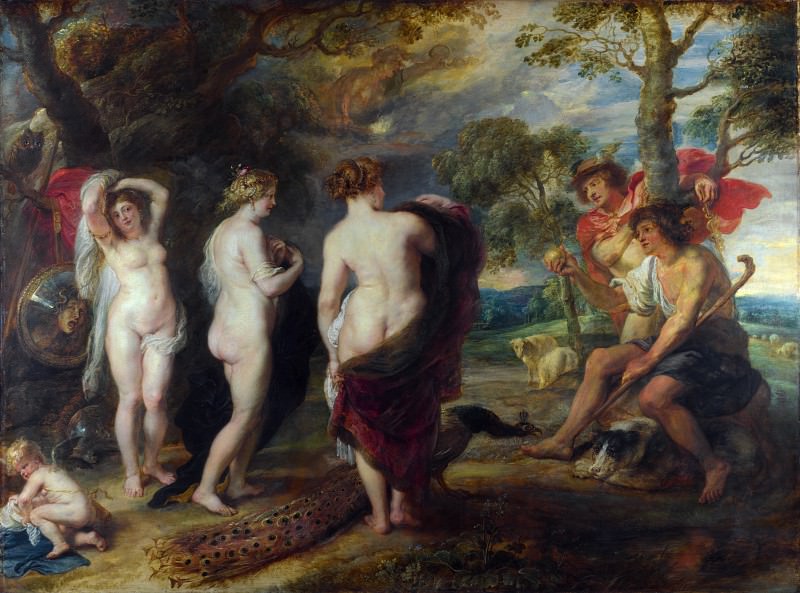The Judgment of Paris Peter Paul Rubens (1577-1640)
Peter Paul Rubens – The Judgment of Paris
Edit attribution
Image taken from other album: gallerix.org/s/1152601724/N/1171297285/
Download full size: 5707×4226 px (7,9 Mb)
Painter: Peter Paul Rubens
Rubens painted a number of magnificent paintings on this popular subject of ancient times. So why was he attracted to this subject? The artist loved the fact that one could depict naked female bodies against the grandiose backdrop of a magnificent landscape. We see Paris. He is dressed in the traditional attire of a shepherd. He looks very closely at the three beauties. They are completely naked.
Description of Peter Rubens’ The Judgment of Paris
Rubens painted a number of magnificent paintings on this popular subject of ancient times. So why was he attracted to this subject? The artist loved the fact that one could depict naked female bodies against the grandiose backdrop of a magnificent landscape.
We see Paris. He is dressed in the traditional attire of a shepherd. He looks very closely at the three beauties. They are completely naked. Nothing should distract from the responsible choice. We see that Paris really likes the three goddesses. The elegance of their poses is impressive. Mercury is holding the coveted apple. It is this that will be the reward.
Venus is depicted accompanied by her son Cupid, Athena with an owl, and Hera with the ever-present peacock. We can see how meek all three goddesses are. They seem to wait quite calmly for Paris’ decision. Nothing at all seems to foreshadow the kind of disastrous consequences that the choice that Paris has made has led to. As we know, it is what led to the outbreak of the devastating war in Troy.
So who is Paris? He is the son of Priam, king of Troy. Even at birth he was predicted that because of him the whole country would perish. His father gave orders that the baby be put to death. The servant took pity on the child and simply left him on the mountain. The shepherds found the child and brought him up.
Paris had to decide which goddess was the most beautiful. The golden apple became the prize. Juno promised him the chance to become the most powerful ruler; Minerva promised that he would be a great hero. Venus promised the love of a beautiful woman. Paris’s choice was predetermined. He decided to name Venus as the beautiful one. But the other two goddesses were very offended. Paris decides to simply kidnap Helen. As a result, war broke out, which resulted in the complete destruction of Troy.
The richness of the colors and lush coloring of Rubens’ painting is impressive. He was able to masterfully convey the beauty of the female body and the splendor of unspoiled nature.
Кому понравилось
Пожалуйста, подождите
На эту операцию может потребоваться несколько секунд.
Информация появится в новом окне,
если открытие новых окон не запрещено в настройках вашего браузера.
You need to login
Для работы с коллекциями – пожалуйста, войдите в аккаунт (open in new window).




















You cannot comment Why?
Paris, the Trojan prince, sits at the right, on a rock, with his flock of sheep nearby. He is offered the golden apple inscribed to the fairest by Mercury, who stands behind him. The goddesses are attempting to bribe Paris in exchange for the apple, with Hera offering dominion, Athena offering victory in battle, and Aphrodite offering the love of the most beautiful woman in the world.
The background of the painting is a pastoral landscape with lush trees and a cloudy sky. A cherub is depicted in the lower left corner, and a mirror reflecting the head of Medusa is visible near Hera, highlighting the complexity of the scene. The subtext of the painting lies in the theme of choice and consequence, as Pariss decision to award the apple to Aphrodite ultimately leads to the Trojan War, a pivotal event in Greek mythology. The painting also explores themes of beauty, power, and human desire, as the goddesses vie for the prize and Paris is faced with a choice that will alter the course of history.